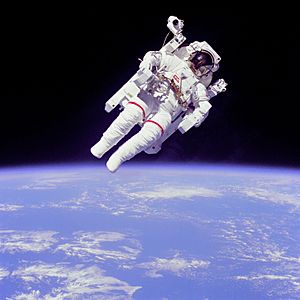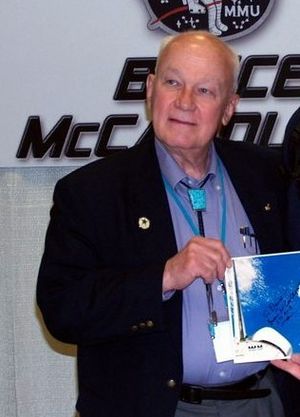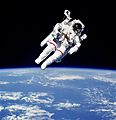Bruce McCandless II facts for kids
Quick facts for kids
Bruce McCandless II
|
|
|---|---|
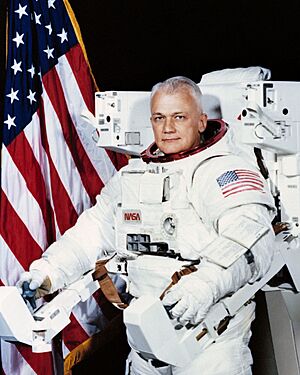
McCandless in 1982
|
|
| Born |
Byron Willis McCandless
June 8, 1937 Boston, Massachusetts, U.S.
|
| Died | December 21, 2017 (aged 80) Los Angeles, California, U.S.
|
| Space career | |
| NASA astronaut | |
| Rank | Captain, USN |
|
Time in space
|
13d 0h 31m |
| Selection | NASA Group 5 (1966) |
|
Total EVAs
|
2 |
|
Total EVA time
|
12h 12m |
| Missions | STS-41-B STS-31 |
|
Mission insignia
|
|
| Retirement | August 31, 1990 |
Bruce McCandless II was an amazing American NASA astronaut, a Navy officer, and an engineer. He is most famous for making history in 1984. During one of his two Space Shuttle missions, he performed the very first spacewalk without being tied to the spacecraft! He used a special jetpack called the Manned Maneuvering Unit to float freely in space.
A Life Among the Stars
Early Years and Learning
Bruce McCandless II was born in Boston, Massachusetts, on June 8, 1937. His family had a strong history with the U.S. Navy. Both his father, Bruce McCandless, and his grandfather, Willis W. Bradley, were brave Navy officers who received the Medal of Honor for their courage. When he was a baby, his mother changed his name to Bruce McCandless II. He finished high school in Long Beach, California, in 1954.
He then attended the United States Naval Academy, a special school for future Navy officers. He earned a degree in 1958, graduating near the top of his class. Later, he continued his studies, earning advanced degrees in electrical engineering from Stanford University and in business from the University of Houston–Clear Lake.
After graduating, Bruce McCandless joined the United States Navy. He went through special flight training in Florida and Texas. In 1960, he officially became a United States Naval Aviator, which means he was a pilot for the Navy.
He flew powerful jet aircraft like the Douglas F4D Skyray and the McDonnell Douglas F-4 Phantom II. He served on large aircraft carriers, including the USS Forrestal and the USS Enterprise. He was even involved during the Cuban Missile Crisis, a very important time in history.
Later, he became a flight instructor, teaching others how to fly. He was skilled at flying many different types of planes and helicopters. In total, he spent over 5,200 hours flying, with most of that time in jet aircraft.
Becoming a NASA Astronaut
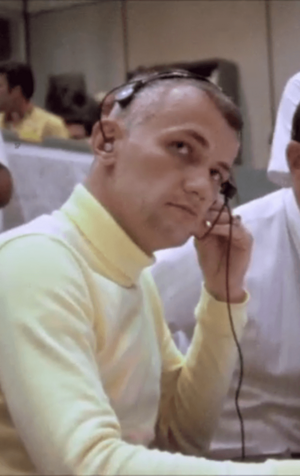
In April 1966, when he was 28 years old, Bruce McCandless was chosen to be a NASA astronaut. He was part of a special group of astronauts. Even though he was a skilled pilot, NASA also valued his scientific knowledge.
He played an important role on the ground during the historic Apollo 11 mission. He was a "CAPCOM," which means he was the main communicator between mission control and the astronauts in space. He spoke to Neil Armstrong and Buzz Aldrin during their first moonwalk! He also helped with the Apollo 14 and Skylab missions in this role.
Preparing for Space Missions
Bruce McCandless was very involved in developing the Manned Maneuvering Unit (MMU). This was a special jetpack that would allow astronauts to fly freely in space without being attached to their spacecraft. He worked hard to make sure this amazing technology was safe and ready for use.
He also helped design equipment and procedures for other major space projects. These included the Hubble Space Telescope and the International Space Station. Over his career, McCandless spent more than 312 hours in space. Four of those hours were spent flying the MMU. He flew on two Space Shuttle missions: STS-41-B and STS-31.
The First Untethered Spacewalk (STS-41-B)
On February 3, 1984, the Space Shuttle Challenger launched from Kennedy Space Center in Florida. This mission was very special because it was the first time the MMU jetpack was tested in space.
Bruce McCandless made history during this flight. He became the first person ever to perform a spacewalk without being connected to the spacecraft by a safety tether! He floated freely in space using the MMU. It was an incredible moment for space exploration.
He later shared how he felt:
I was very ready to go out there and fly. I felt very comfortable ... It was a wonderful feeling, a mix of personal excitement and professional pride: it had taken many years to get to that point.
His first untethered spacewalk lasted over 6 hours. Another astronaut, Robert L. Stewart, also used the MMU on this mission. After eight days, the Challenger landed back on Earth.
Deploying the Hubble Telescope (STS-31)
Bruce McCandless flew on his second space mission aboard the Space Shuttle Discovery. This flight launched on April 24, 1990. The main goal was to deploy the amazing Hubble Space Telescope into orbit. They released Hubble from a record-high altitude!
During the deployment, one of Hubble's solar panels got stuck. Bruce McCandless and fellow astronaut Kathryn D. Sullivan got ready for an emergency spacewalk. They were prepared to fix the panel if needed. Luckily, ground control was able to fix it remotely, and the panel opened. The Discovery landed safely on April 29, 1990.
After His Space Adventures
After leaving NASA in 1990, Bruce McCandless continued to work in the space industry. He joined Lockheed Martin Space Systems, a company that builds spacecraft and other advanced technology.
Making a Difference: Organizations and Awards
Bruce McCandless was part of many important groups. These included the United States Naval Academy Alumni Association and the American Institute of Aeronautics and Astronautics (AIAA), which focuses on space and flight. He was also a member of the National Audubon Society, showing his interest in nature. He even served as the president of the Houston Audubon Society.
He received many awards and honors for his service and achievements. Some of these include:
- NASA Exceptional Service Medal (1974)
- National Defense Service Medal (1974)
- Armed Forces Expeditionary Medal (1974)
- NASA Space Flight Medal (1984)
- Defense Distinguished Service Medal (1985)
- NASA Exceptional Engineering Achievement Medal (1985)
- Collier Trophy (1984)
- National Air and Space Museum Trophy (1985)
- Legion of Merit (1988)
- International Space Hall of Fame (1995)
- United States Astronaut Hall of Fame (2005)
He also received a patent for designing a special tool tethering system used during spacewalks.
His Personal Journey
Bruce McCandless was married to Bernice Doyle McCandless for 53 years, and they had two children. His hobbies included electronics, photography, scuba diving, and flying. He also enjoyed cross-country skiing.
He once said about his famous spacewalk photo: "I have the sun visor down, so you can't see my face, and that means it could be anybody in there. It's sort of a representation not of Bruce McCandless, but mankind." This shows how he saw his achievement as something for all of humanity.
There was a discussion regarding the use of his famous spacewalk photo on an album cover, which was later resolved.
Bruce McCandless passed away on December 21, 2017, at the age of 80. He was buried at the United States Naval Academy Cemetery. His son, Bruce McCandless III, wrote a book in 2021 about his father's incredible journey to the first untethered spacewalk.
A Lasting Legacy
John McCain, who was a classmate of McCandless at the Naval Academy, said after his death:
The iconic photo of Bruce soaring effortlessly in space has inspired generations of Americans to believe that there is no limit to the human potential.
The company Lockheed Martin later honored him by naming a lunar lander design, the McCandless Lunar Lander, after him. This recognized his important work as an employee and his pioneering untethered spacewalk using the MMU, which Lockheed Martin helped develop.
See also
 In Spanish: Bruce McCandless II para niños
In Spanish: Bruce McCandless II para niños
Images for kids
 | Percy Lavon Julian |
 | Katherine Johnson |
 | George Washington Carver |
 | Annie Easley |


